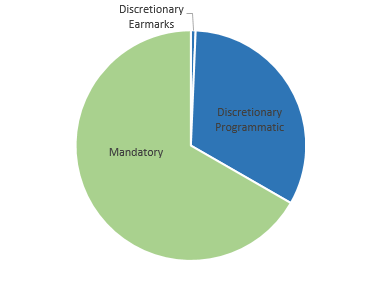
Therefore, most of the federal money awarded to entities in Hawai‘i (e.g., state and local government, non-profit organizations, and for-profit businesses) qualifies as programmatic funding. Programmatic funds can come in the form of:
- discretionary grants, which are made by federal agencies on a competitive basis (i.e., requiring an application);
- loans; or
- via a formula determined by statute.
State and local governments, organizations, or other communities that benefit, or stand to benefit, from existing federal programs can advocate for additional resources to those programs by submitting programmatic funding requests. There are multiple avenues for influencing programmatic funding, including requesting increased funding, a set-aside, report language, or bill text. Members of Senator Schatz’s legislative staff can help determine the best approach to achieve the desired outcome.
Bill Text and Report Language
Members of Congress can submit requests for language to be included in the federal funding bills. They can also submit requests for language to be included in the committee reports published alongside the federal funding bills. While report language is not law, it is an opportunity for Members of Congress to clarify the intent of bill language or request that agencies to act in a certain way. Report language can change how funds from a program are distributed, which—sometimes in combination with increases to the total levels—can result in more funding for some organizations or new funding for an organization that has not received any in the past. You can read the fiscal year appropriations reports (or “Explanatory Statements”) here for examples.
Appropriations Subcommittees
The Senate Appropriations committee is responsible for the yearly appropriations process. The committee is divided into 12 subcommittees that draft legislation to allocate funding to the federal agencies within their jurisdictions. For programmatic appropriations requests, you will need to know which subcommittee has jurisdiction over your request. The full jurisdiction of each subcommittee is viewable on the Appropriations committee’s website.
Types of Programmatic Funding
The majority of programmatic funding requests will be to support either formula or competitive grant programs.
The amount each formula grant awardee receives is determined by a set formula. Increasing the overall or national funding for a formula grant program can result in increases for Hawai‘i without additional applications. Similarly, programmatic bill or report language requests can have a Hawai‘i-specific benefit but will apply nationally to the program or agency.
Competitive grants require applications, meaning that an increase in federal funding for a competitive grant program will not guarantee an increase in funding for your specific program.
If you have not submitted an appropriations request in previous years, we strongly recommend that you speak to a member of Senator Schatz’s legislative staff before beginning. Please see this list to reach the relevant staffer or contact Schatz_Appropriations@schatz.senate.gov to be connected with the appropriate legislative staffer.
